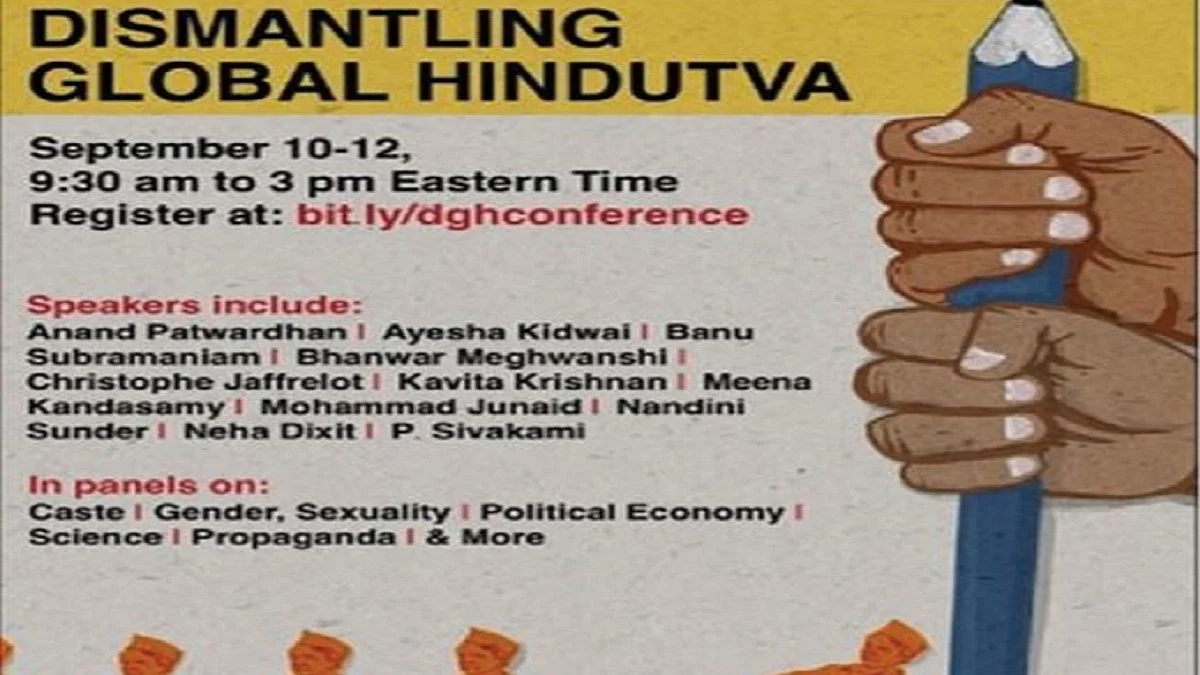Privilege, prejudice and politics mark campaign against conference on ‘Hindutva’
In late 1980s, we discussed Hinduism like never before. We discussed Islam threadbare some 10 years later. Discussions took us nowhere because problem lay in the believers, points out Ranjona Banerji

The success of the bigoted right wing majoritarian is to muddy all waters, especially where reason and compassion abide. It lies in willy-nilly getting you to examine your deepest held beliefs and wonder if somewhere the arguments of the prejudiced may be allowed some space.
It is such a clever tactic that it draws many people in. The privileged pose as victims, the questioner is framed as a menace. For instance, questioning caste entitlement and caste discrimination can make you anti-national or just anti. There is logically no connection between nationalism and caste entitlement. In fact, quite the opposite. The Constitution of India guarantees no more caste discrimination. Yet, the narrative has been so consummately flipped that even those who felt that discrimination is wrong now question themselves.
The change has been slow and brought about masterfully. Look at the way the word “secular” has now been completely discredited in everyday conversation. From LK Advani’s “pseudo-secular” for everyone who stood for a separation of state and religion to today, when almost no one will proudly wear their secularism on their sleeve the way they did 40 years ago.
This right wing narrative is so crafty, its co-option of the symbols and arguments of its opponents so thorough, that victory in a sense is inevitable. It works effectively as long as the audience willingly suspends all disbelief as we do with magic tricks. Because between the demolition of the Babri Masjid and today, secularism is still ingrained in our Constitution, and as India we take our very being from that Constitution. And caste discrimination remains hateful as does caste privilege.
Hindu majoritarianism is not an expression of victimhood. It is a call of high entitlement entirely contingent on the subjugation and misery of others. There is nothing there but empty frustration at being denied the whole pie.
Hardline proponents of any religion, those who want status quo or the return to some mythical past or the strict obedience to a written holy word of millennia ago, thrive on such discussions. It only gives their stranglehold more power.
Also, it takes the conversation out of the hands of the academics, the sceptics, the historians, the philosophers, the believers, where it should be, and into the hands of the prejudiced semi-educated bigot. The minutiae of Vedic eating habits cannot be used as legitimate ploy to destroy people in a 21st century democratic republic.
And yet. Here we are.
Instead, discussions about how and why privilege and prejudice overtake belief systems and lead to violence, hatred and discrimination is a must. The politics of religion rather than the need to believe or the joy of believing is what is significant.
The desperate rage of the Hindutva brigade at the international multi-university multi-disciplinary Dismantling Global Hindutva Conference, which ends today, only underlines how vicious Hindutva proponents get when they are exposed or questioned. And then these supposed upholders of a faith of high spiritual and philosophic worth, of tolerance and beauty, turn onto monstrous creatures of violence. They have abused and threatened those speaking at the conference.
They have claimed “Hinduphobia”, which is nothing but one more gambit to confuse the already confused and the ignorant. There is no Hinduphobia. There is and there must continue to be a reaction to Hindutva and majoritarian supremacy. There has to be a strong recoil to the consistent violent targeting of women, religious minorities and those tagged as “low caste” by a despicable system of false superiority or will our future be?
The concept of “tat tvam asi” has long fascinated students of Hindu philosophy. Thou art that or that art thou. The combination of the outer world and the inner mind, of the outer masculine or inner feminine, or in whatever way you interpret it. Like so much of ancient philosophy, the effort is to open minds. Not to build barriers and punish people on the outside. But there are intrinsically elements of exclusion to such ideas. For one, the exclusion by caste – high thought limited to the high born, the bane of Indian civilization to this day.
And then, the exclusion of understanding. And it is this exclusion which has hurt our Hindutva proponents and Hindu supremacists the most. They cannot accept their inadequacies, and for that they must punish those who practise other faiths or practise no faith at all.
How long we continue to live without dismantling their traps is how long we will be trapped by their iniquity.
(The writer is a senior journalist and commentator. Views are personal)
Follow us on: Facebook, Twitter, Google News, Instagram
Join our official telegram channel (@nationalherald) and stay updated with the latest headlines
